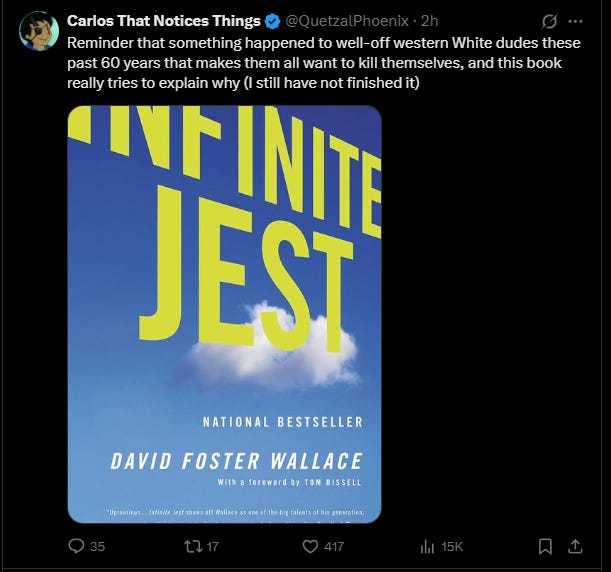The Ethics of Affluence
Why prosperity destroys meaning only when we fail to seek worthy struggles.
Infinite Jest is a book about the annihilation of agency under the weight of abundance. The postwar West, for its most comfortable men, removed the ancient struggle against famine, plague, and cold. Survival became trivial. But when necessity vanished, so did the scaffolding of meaning.
Agency exists only in the tension between constraint and possibility. It requires resistance, friction, limits. When every appetite can be indulged, when every resistance neutralized, choice collapses into compulsion. The characters in Wallace’s world are not deprived — they are drowning in plenty. Tennis prodigies, addicts, bureaucrats: all are trapped in a void where freedom itself corrodes into futility.
Affluence, by stripping away the resistance against which agency once defined itself, leaves us with the shell of freedom but none of its substance. What remains is not liberation but paralysis, a landscape of endless choice where nothing carries weight and every path collapses into hollowness.
Yet affluence need not be a coffin. It is also an achievement, the hard-won conquest of scarcity. The danger lies in passive affluence — comfort without challenge, plenty without purpose. The path forward is to reintroduce adversity deliberately and ethically: discipline of body and mind, creation of what does not yet exist, service to causes beyond the self, truth-seeking in the face of error, and risks where outcomes matter. These are not deprivations but chosen constraints, the scaffolding on which agency thrives.
The lesson is not to flee affluence but to wield it: to turn prosperity into the freedom to choose worthy struggles. Only then does abundance cease to corrode, and instead become the ground of flourishing.



